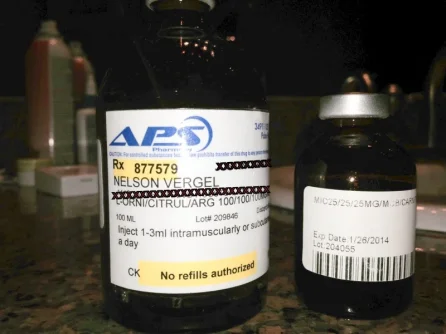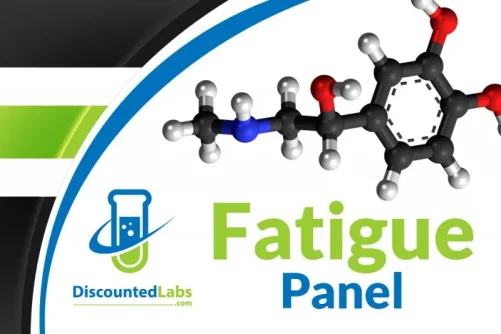Taken from the book: Testosterone: A Man’s Guide by Nelson Vergel
If no improvements in fatigue are observed after 6 weeks of testosterone replacement, factors beyond hypogonadism may be present.

Thyroid and adrenal function should be checked to ensure that those two glands are working properly. Sleep apnea can also be a factor involved in the failure to improve stamina. Depression may still need to be addressed with proper medications and counseling.
Suggested Blood Tests to Diagnose Potential Causes for Fatigue While on TRT
Thyroid Function:
The thyroid is a butterfly-shaped endocrine gland located in the lower front of the neck. It produces thyroxine or T4, which is converted to triiodothyronine, or T3. T4 production is controlled by thyroid stimulating hormone or TSH, a hormone produced by the pituitary. Hypothyroidism, or low thyroid hormone production, can cause sexual dysfunction as well as depression, fatigue, dry skin and hair, weight gain and increased sensitivity to the cold. Blood tests to measure TSH, T4, and T3 are readily available and widely used.
The American Thyroid Association (thyroid.org) has great comprehensive information on how to determine if you have hypothyroidism that could be causing your fatigue.
Testosterone may decrease levels of thyroxin-binding globulin, resulting in decreased total T4 serum levels and increased resin uptake of T3 and T4. Free thyroid hormone levels remain unchanged, however, and there is no clinical evidence of thyroid dysfunction.
Once thyroid hormone blood levels have been normalized, testosterone tends to increase naturally.
Check your thyroid hormones here: Choose Your Test | Discounted Labs
Adrenal Function:
The adrenal glands, located in the abdomen above the kidneys, regulate stress in the human body. When the body encounters an emergency situation, the adrenal glands release hormones, such as adrenaline, that enable the body to respond accordingly. You may have encountered this reaction, called the “fight or flight” response, if you have encountered danger, fear or shock. Adrenal fatigue is the controversial idea that the adrenal glands can become worn out, creating illness, if continually overstimulated. Proponents of the “adrenal fatigue” theory hold that the adrenal glands may be overworked in some individuals and therefore become “fatigued” and unable to produce sufficient hormones. When your adrenal glands become exhausted, your natural cortisol levels drop significantly. Cortisol is your naturally occurring stress hormone. In addition to low sex drive and infertility, symptoms of adrenal fatigue may include chronic fatigue, low blood pressure and low blood sugar, dizziness, headaches, anxiety or panic attacks, depression, and other equally debilitating problems.
Some doctors may prescribe low doses of corticoid steroids if your morning levels of cortisol (measure by blood, saliva or urine tests) are low. But be careful with corticoid steroids since they can increase fat mass and decrease bone density if given in doses that exceed what the healthy adrenals would produce.
Click here: Are you tired even with normal testosterone? Adrenal fatigue may be the problem.
DHEA:
The adrenal glands also produce dehydroepiandrosterone (DHEA), the most abundant hormone found in the bloodstream. The body uses DHEA as the starting material for producing the sex hormones testosterone and estrogen in men. Studies have shown that it only increases testosterone in women. The production of DHEA diminishes in most people after age 40. In people aged 70 years, DHEA levels will be approximately 30 percent lower than what they were at age 25. Low blood levels of DHEA have been associated with many degenerative conditions.
Some controversial and non-conclusive studies have shown that people with immune deficiencies and fatigue may benefit from supplementation with this hormone. It is still available over-the-counter in the United States. This may change soon due to a new bill passed by Congress that classifies it as a performance-enhancing steroid (no studies have shown that it has such effect).
One study showed that women with the correct levels of DHEA can convert it into testosterone as their body needs while men do not benefit to the same degree. You need a blood test to know if you have low DHEA-S since most of the DHEA converts into this sulfated form. Common doses for women are 5 to 30 mg a day, while men tend to benefit from 25-100 mg per day (to bring low levels of DHEA-S to normal)

NOTE: Do not use DHEA supplements unless your blood levels of DHEA-S are low. If low, start at a low dose and get your DHEA-S tested again after a month. Men who use DHEA supplements may have problems with higher estrogen levels since DHEA can also metabolize into estradiol. This could result in gynecomastia and water retention. If you start taking DHEA, have your blood levels checked to make sure they are not above normal. There are many claims about DHEA being an anti-aging and an anti-cancer cure, but none of these claims has been substantiated with strong data.
To facilitate diagnosis, I have created this new Fatigue Exploration Panel on DiscountedLabs.com at a deep discount.
Click here: Comprehensive Fatigue Panel
Sleep Apnea:
Sleep apnea is a sleep disorder in which a person briefly stops breathing or breathes shallowly many times during sleep and therefore does not get enough restful sleep; oxygen levels drop in the blood, starving the brain of oxygen. In addition to causing daytime fatigue, it can increase blood pressure and cardiovascular risks. Testosterone replacement therapy has been associated with exacerbation of sleep apnea or with the development of sleep apnea, generally in men who use higher doses of testosterone or who have other identifiable risk factors for sleep apnea (high body weight, thick necks, snoring, alcohol consumption, and others). Upper- airway narrowing does not seem to be caused by testosterone replacement therapy, suggesting that testosterone replacement contributes to sleep-disordered breathing by central mechanisms rather than by means of anatomical changes in the airway.

If your spouse or partner complains that you snore loudly at night and you suffer from fatigue, tell your doctor. The only real way to find out if you have sleep apnea is to have your doctor refer you to a sleep lab for a sleep study. If you are diagnosed with sleep apnea, a Continuous Pressure Airway Pressure (CPAP) machine can be prescribed to help you open up your airways with a small air pump while you sleep. Some people love it while some hate wearing a mask while being hooked up to a machine at night. I have seen men regain their quality of life after starting CPAP. It is paid by insurance, Medicare and most HMOs.
A new emerging option for those who hate CPAP machines with mild to moderate apnea is the use of oral appliances. Worn in the mouth like an orthodontic appliance during sleep, oral appliances keep the soft tissue from collapsing and interrupting normal breathing patterns. The purpose of the oral appliance may be to reposition the lower jaw, tongue, soft palate, and hyoid bone into a certain position, to keep the airway open with stabilization of the tongue and jaw, or to provide artificial muscle tone to prevent collapse and resulting airway blockage. The doctors will fit your oral appliance for comfort by using a mold of your mouth to design your unique fit.
Sleep apnea appliances fall into two categories: fixed and adjustable. Here are brief descriptions of some commonly used sleep apnea dental appliances:
TAP® 3 (Thornton Adjustable Positioner)
The TAP® 3 is the smallest, most comfortable member of the TAP family. It is a two-part custom-created sleep apnea appliance that fits over the teeth in much the same way as a sports mouthguard. The TAP® 3 projects the jaw forward to prevent the tongue and soft tissues from impeding the airway. The lower jaw positioner is adjustable, which means that it can be altered to suit the comfort level of the wearer. The TAP® 3 appliance can accommodate the three main types of malocclusion and allows the lips to fully close.

OASYS Appliance
The OASYS appliance is designed to move the base of the tongue toward the front of the mouth by gently repositioning the jawbone (mandible). This shift opens the oropharynx and strengthens the upper airway. An extension of the upper shield projects toward the nose, creating a larger nasal opening and less resistance to normal airflow. This adjustable appliance is comfortable to wear and extremely patient-friendly.
Klearway Appliance
The Klearway Appliance is generally used to alleviate obstructive sleep disorder and eliminate snoring. The patient or dentist can project the jaw forwards in increments of .25mm at a time. This ensures maximum comfort for the sleeper. The Klearway appliance is made from Variflex heat softening acrylic, which makes it easier to insert. Running warm water over the appliance makes it pliable, but once placed in the desired position, the acrylic hardens again.
Herbst Telescopic Appliance
The Herbst appliance is held in the mouth by clasps and friction grips. It is made of acrylic, and contains adjustable metal wiring. The advantage of this appliance is that the wearer is able to move vertically and laterally without dislodging the appliance. The Herbst appliance is usually used in mild and moderate cases of sleep apnea, and can also alleviate loud snoring effectively.
If you have questions or concerns about sleep apnea appliances, please ask your dentist. To locate a dentist in your area that uses these products, visit: www.endsnore.com/request-form.aspx
Some people have reported good results with the use of this over-the-counter cheaper product: Reduce Snoring With an Adjustable Snoring Mouthpiece | SnoreRx
Stimulants:
Some physicians prescribe drugs like Nuvigil, Ritalin or Adderall when everything else fails.
Armodafinil (brand name Nuvigil) is used to treat excessive sleepiness caused by narcolepsy (a condition of excessive daytime sleepiness) or shift work sleep disorder (sleepiness during scheduled waking hours and difficulty falling asleep or staying asleep during scheduled sleeping hours in people who work at night or on rotating shifts). Armodafinil is also used along with breathing devices or other treatments to prevent excessive sleepiness caused by obstructive sleep apnea/hypopnea syndrome. Armodafinil is in a class of medications called wakefulness-promoting agents. It works by changing the amounts of certain natural substances in the area of the brain that controls sleep and wakefulness. Some insurance companies do not want to pay for it. It is not an amphetamine and it does not require a special prescription since it not a class III DEA regulated drug. Many doctors have samples so that you can try it before you commit to using it.
Ritalin and Adderall (both come in cheaper generics) are also being prescribed to people with severe fatigue that does not respond to usual means.
Methylphenidate (Ritalin, Ritalin SR, Methylin, Methylin ER) is used as part of a treatment program to control symptoms of attention deficit hyperactivity disorder (ADHD) in adults and children. Methylphenidate is also used to treat narcolepsy. Methylphenidate is in a class of medications called central nervous system (CNS) stimulants. It works by changing the amounts of certain natural substances in the brain.
Adderall is a brand-name psychostimulant medication composed of racemic amphetamine aspartate monohydrate, racemic amphetamine sulfate, dextroamphetamine saccharide and dextroamphetamine sulfate, which is thought to work by increasing the amount of dopamine and norepinephrine in the brain. Adderall is widely reported to increase alertness, libido, concentration and overall cognitive performance while decreasing user fatigue. It is available in two formulations: IR (Instant Release) and XR (Extended Release). The immediate-release formulation is indicated for use in Attention Deficit Hyperactivity Disorder (ADHD) and narcolepsy, while the XR formulation is approved for use only with ADHD. In the United States, Adderall is a Schedule II drug under the Controlled Substance Act due to having significant abuse and addiction potential. It requires a triplicate prescription in many states.
There are some concerning data on the use of stimulants and increased cardiovascular risks, so it is important to talk to your doctor about this. Sometimes calculated risks are taken when nothing else works to regain a normal quality of life!
If you and your doctor decide that stimulants are a reasonable option, you will need to review the many potential drug interactions, physical health and mental health complications that can occur.
Over-the-Counter Supplement: SAMe
SAMe (SAM-e, S-adenosyl-methionine, or S-adenosyl-L-methionine) is a naturally occurring compound that is found in every cell in the body. It is produced within the body from the essential sulfur-containing amino acid methionine. Protein-rich foods are sources of this amino acid. It is an antioxidant and it has shown to have liver-protecting properties.

SAMe is generally considered safe when taken in appropriate doses. People with bipolar (manic/depressive) disorder should be aware that it could trigger a manic phase. People taking standard antidepressants, including MAO inhibitors, SSRIs, and tricyclics should not take SAMe except on a physician’s advice. It has been shown to help SSRI drugs work better when used in combination. It is fairly well tolerated but be it can cause jitteriness or gut problems in some.
I am convinced that this supplement works for depression and fatigue. I have taken 400 mg twice a day for a few months and can definitely feel a difference. I actually get reminded when I do not take it by my having decreased energy. An added bonus is that it can also decrease liver enzymes.
SAMe is not cheap. There are many different manufacturers but I use the Jarrow Formulas brand, as I trust their quality control. It comes in foil-protected 200 mg-capsules since it tends to lose its effectiveness when exposed to air.
I am including a study done at ACRIA that found benefits in treating depression in people living with HIV: www.pubmedcentral.nih.gov/articlerender.fcgi?artid=535560
Talk to your doctor before taking this supplement. Do not stop taking your antidepressants to switch to SAMe since it has not been fully studied in large controlled studies.
Start at a small dose of 100 mg twice a day on an empty stomach and see how you feel with that dose. If you do not feel any more energy, increase the dose to 200 mg twice a day and so on until the maximum dose of 400 mg twice is achieved. You may have to lower the dose if you start feeling anxious.
PERSONAL COMMENTS: Because of terrible bouts with fatigue in the past, I was referred to a sleep lab and diagnosed with mild sleep apnea. I tried CPAP with different masks (they are smaller ones with “nose pillows” and many other designs, so don’t give up early without trying different styles). I could not get used to it. I have had my thyroid and adrenal functions checked without finding any problems. I have tried Nuvigil, Adderall, and SAMe with good results for my fatigue. Unfortunately, I get anxious if I use them for long periods, so I only use them as needed. What has made the most difference, besides keeping my testosterone in the upper side of the normal range, is going to bed around the same time at night and waking up also at the same time. Traveling and other factors can interfere with maintaining a normal sleep cycle, but the fact is I need to listen to my body’s needs. I can usually be tired enough to get better sleep by the time bedtime arrives if I avoid caffeine after 3 pm and don’t exercise too late at night. Being aware of any potential bouts of depression and negative thinking has also helped me to be proactive about not letting my energy levels plummet.
Another common reason why you are tired while using TRT: Low ferritin.

 www.excelmale.com
www.excelmale.com
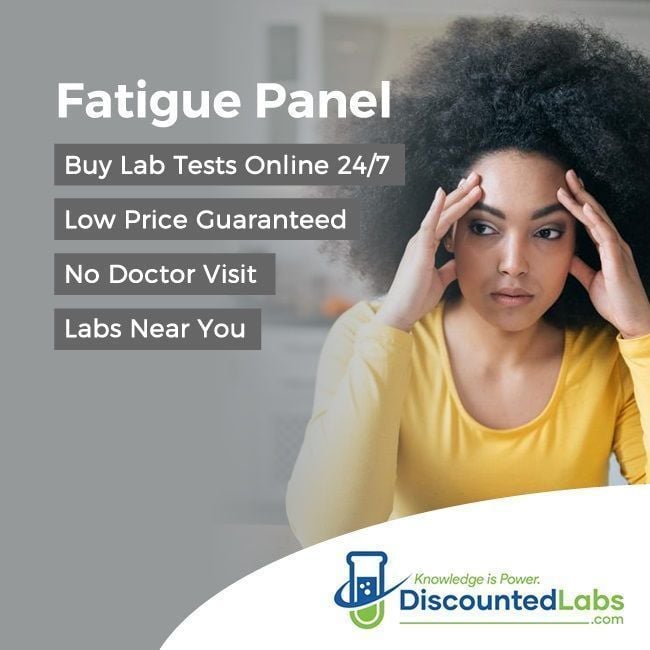

If no improvements in fatigue are observed after 6 weeks of testosterone replacement, factors beyond hypogonadism may be present.
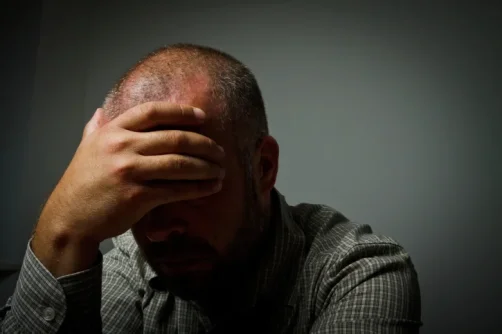
Thyroid and adrenal function should be checked to ensure that those two glands are working properly. Sleep apnea can also be a factor involved in the failure to improve stamina. Depression may still need to be addressed with proper medications and counseling.
Suggested Blood Tests to Diagnose Potential Causes for Fatigue While on TRT
Thyroid Function:
The thyroid is a butterfly-shaped endocrine gland located in the lower front of the neck. It produces thyroxine or T4, which is converted to triiodothyronine, or T3. T4 production is controlled by thyroid stimulating hormone or TSH, a hormone produced by the pituitary. Hypothyroidism, or low thyroid hormone production, can cause sexual dysfunction as well as depression, fatigue, dry skin and hair, weight gain and increased sensitivity to the cold. Blood tests to measure TSH, T4, and T3 are readily available and widely used.
The American Thyroid Association (thyroid.org) has great comprehensive information on how to determine if you have hypothyroidism that could be causing your fatigue.
Testosterone may decrease levels of thyroxin-binding globulin, resulting in decreased total T4 serum levels and increased resin uptake of T3 and T4. Free thyroid hormone levels remain unchanged, however, and there is no clinical evidence of thyroid dysfunction.
Once thyroid hormone blood levels have been normalized, testosterone tends to increase naturally.
Check your thyroid hormones here: Choose Your Test | Discounted Labs
Adrenal Function:
The adrenal glands, located in the abdomen above the kidneys, regulate stress in the human body. When the body encounters an emergency situation, the adrenal glands release hormones, such as adrenaline, that enable the body to respond accordingly. You may have encountered this reaction, called the “fight or flight” response, if you have encountered danger, fear or shock. Adrenal fatigue is the controversial idea that the adrenal glands can become worn out, creating illness, if continually overstimulated. Proponents of the “adrenal fatigue” theory hold that the adrenal glands may be overworked in some individuals and therefore become “fatigued” and unable to produce sufficient hormones. When your adrenal glands become exhausted, your natural cortisol levels drop significantly. Cortisol is your naturally occurring stress hormone. In addition to low sex drive and infertility, symptoms of adrenal fatigue may include chronic fatigue, low blood pressure and low blood sugar, dizziness, headaches, anxiety or panic attacks, depression, and other equally debilitating problems.
Some doctors may prescribe low doses of corticoid steroids if your morning levels of cortisol (measure by blood, saliva or urine tests) are low. But be careful with corticoid steroids since they can increase fat mass and decrease bone density if given in doses that exceed what the healthy adrenals would produce.
Click here: Are you tired even with normal testosterone? Adrenal fatigue may be the problem.
DHEA:
The adrenal glands also produce dehydroepiandrosterone (DHEA), the most abundant hormone found in the bloodstream. The body uses DHEA as the starting material for producing the sex hormones testosterone and estrogen in men. Studies have shown that it only increases testosterone in women. The production of DHEA diminishes in most people after age 40. In people aged 70 years, DHEA levels will be approximately 30 percent lower than what they were at age 25. Low blood levels of DHEA have been associated with many degenerative conditions.
Some controversial and non-conclusive studies have shown that people with immune deficiencies and fatigue may benefit from supplementation with this hormone. It is still available over-the-counter in the United States. This may change soon due to a new bill passed by Congress that classifies it as a performance-enhancing steroid (no studies have shown that it has such effect).
One study showed that women with the correct levels of DHEA can convert it into testosterone as their body needs while men do not benefit to the same degree. You need a blood test to know if you have low DHEA-S since most of the DHEA converts into this sulfated form. Common doses for women are 5 to 30 mg a day, while men tend to benefit from 25-100 mg per day (to bring low levels of DHEA-S to normal)
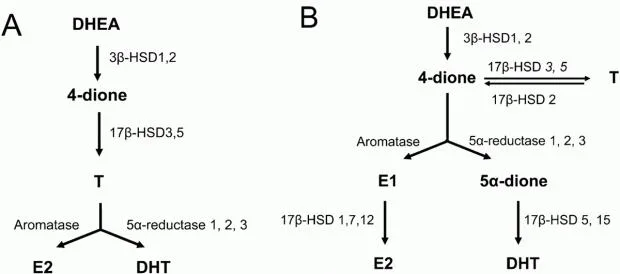
NOTE: Do not use DHEA supplements unless your blood levels of DHEA-S are low. If low, start at a low dose and get your DHEA-S tested again after a month. Men who use DHEA supplements may have problems with higher estrogen levels since DHEA can also metabolize into estradiol. This could result in gynecomastia and water retention. If you start taking DHEA, have your blood levels checked to make sure they are not above normal. There are many claims about DHEA being an anti-aging and an anti-cancer cure, but none of these claims has been substantiated with strong data.
To facilitate diagnosis, I have created this new Fatigue Exploration Panel on DiscountedLabs.com at a deep discount.
Click here: Comprehensive Fatigue Panel
Sleep Apnea:
Sleep apnea is a sleep disorder in which a person briefly stops breathing or breathes shallowly many times during sleep and therefore does not get enough restful sleep; oxygen levels drop in the blood, starving the brain of oxygen. In addition to causing daytime fatigue, it can increase blood pressure and cardiovascular risks. Testosterone replacement therapy has been associated with exacerbation of sleep apnea or with the development of sleep apnea, generally in men who use higher doses of testosterone or who have other identifiable risk factors for sleep apnea (high body weight, thick necks, snoring, alcohol consumption, and others). Upper- airway narrowing does not seem to be caused by testosterone replacement therapy, suggesting that testosterone replacement contributes to sleep-disordered breathing by central mechanisms rather than by means of anatomical changes in the airway.
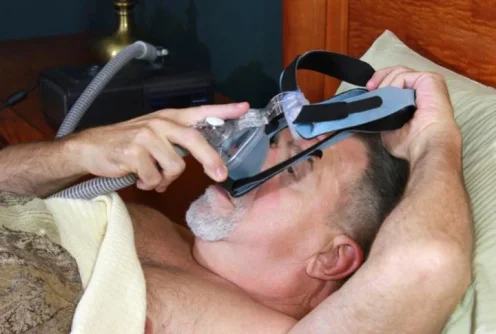
If your spouse or partner complains that you snore loudly at night and you suffer from fatigue, tell your doctor. The only real way to find out if you have sleep apnea is to have your doctor refer you to a sleep lab for a sleep study. If you are diagnosed with sleep apnea, a Continuous Pressure Airway Pressure (CPAP) machine can be prescribed to help you open up your airways with a small air pump while you sleep. Some people love it while some hate wearing a mask while being hooked up to a machine at night. I have seen men regain their quality of life after starting CPAP. It is paid by insurance, Medicare and most HMOs.
A new emerging option for those who hate CPAP machines with mild to moderate apnea is the use of oral appliances. Worn in the mouth like an orthodontic appliance during sleep, oral appliances keep the soft tissue from collapsing and interrupting normal breathing patterns. The purpose of the oral appliance may be to reposition the lower jaw, tongue, soft palate, and hyoid bone into a certain position, to keep the airway open with stabilization of the tongue and jaw, or to provide artificial muscle tone to prevent collapse and resulting airway blockage. The doctors will fit your oral appliance for comfort by using a mold of your mouth to design your unique fit.
Sleep apnea appliances fall into two categories: fixed and adjustable. Here are brief descriptions of some commonly used sleep apnea dental appliances:
TAP® 3 (Thornton Adjustable Positioner)
The TAP® 3 is the smallest, most comfortable member of the TAP family. It is a two-part custom-created sleep apnea appliance that fits over the teeth in much the same way as a sports mouthguard. The TAP® 3 projects the jaw forward to prevent the tongue and soft tissues from impeding the airway. The lower jaw positioner is adjustable, which means that it can be altered to suit the comfort level of the wearer. The TAP® 3 appliance can accommodate the three main types of malocclusion and allows the lips to fully close.
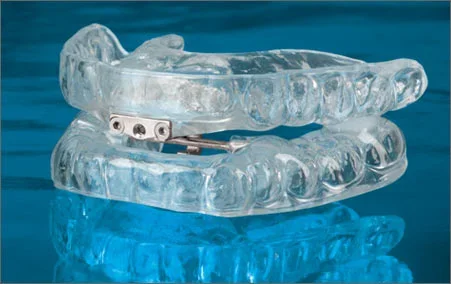
OASYS Appliance
The OASYS appliance is designed to move the base of the tongue toward the front of the mouth by gently repositioning the jawbone (mandible). This shift opens the oropharynx and strengthens the upper airway. An extension of the upper shield projects toward the nose, creating a larger nasal opening and less resistance to normal airflow. This adjustable appliance is comfortable to wear and extremely patient-friendly.
Klearway Appliance
The Klearway Appliance is generally used to alleviate obstructive sleep disorder and eliminate snoring. The patient or dentist can project the jaw forwards in increments of .25mm at a time. This ensures maximum comfort for the sleeper. The Klearway appliance is made from Variflex heat softening acrylic, which makes it easier to insert. Running warm water over the appliance makes it pliable, but once placed in the desired position, the acrylic hardens again.
Herbst Telescopic Appliance
The Herbst appliance is held in the mouth by clasps and friction grips. It is made of acrylic, and contains adjustable metal wiring. The advantage of this appliance is that the wearer is able to move vertically and laterally without dislodging the appliance. The Herbst appliance is usually used in mild and moderate cases of sleep apnea, and can also alleviate loud snoring effectively.
If you have questions or concerns about sleep apnea appliances, please ask your dentist. To locate a dentist in your area that uses these products, visit: www.endsnore.com/request-form.aspx
Some people have reported good results with the use of this over-the-counter cheaper product: Reduce Snoring With an Adjustable Snoring Mouthpiece | SnoreRx
Stimulants:
Some physicians prescribe drugs like Nuvigil, Ritalin or Adderall when everything else fails.
Armodafinil (brand name Nuvigil) is used to treat excessive sleepiness caused by narcolepsy (a condition of excessive daytime sleepiness) or shift work sleep disorder (sleepiness during scheduled waking hours and difficulty falling asleep or staying asleep during scheduled sleeping hours in people who work at night or on rotating shifts). Armodafinil is also used along with breathing devices or other treatments to prevent excessive sleepiness caused by obstructive sleep apnea/hypopnea syndrome. Armodafinil is in a class of medications called wakefulness-promoting agents. It works by changing the amounts of certain natural substances in the area of the brain that controls sleep and wakefulness. Some insurance companies do not want to pay for it. It is not an amphetamine and it does not require a special prescription since it not a class III DEA regulated drug. Many doctors have samples so that you can try it before you commit to using it.
Ritalin and Adderall (both come in cheaper generics) are also being prescribed to people with severe fatigue that does not respond to usual means.
Methylphenidate (Ritalin, Ritalin SR, Methylin, Methylin ER) is used as part of a treatment program to control symptoms of attention deficit hyperactivity disorder (ADHD) in adults and children. Methylphenidate is also used to treat narcolepsy. Methylphenidate is in a class of medications called central nervous system (CNS) stimulants. It works by changing the amounts of certain natural substances in the brain.
Adderall is a brand-name psychostimulant medication composed of racemic amphetamine aspartate monohydrate, racemic amphetamine sulfate, dextroamphetamine saccharide and dextroamphetamine sulfate, which is thought to work by increasing the amount of dopamine and norepinephrine in the brain. Adderall is widely reported to increase alertness, libido, concentration and overall cognitive performance while decreasing user fatigue. It is available in two formulations: IR (Instant Release) and XR (Extended Release). The immediate-release formulation is indicated for use in Attention Deficit Hyperactivity Disorder (ADHD) and narcolepsy, while the XR formulation is approved for use only with ADHD. In the United States, Adderall is a Schedule II drug under the Controlled Substance Act due to having significant abuse and addiction potential. It requires a triplicate prescription in many states.
There are some concerning data on the use of stimulants and increased cardiovascular risks, so it is important to talk to your doctor about this. Sometimes calculated risks are taken when nothing else works to regain a normal quality of life!
If you and your doctor decide that stimulants are a reasonable option, you will need to review the many potential drug interactions, physical health and mental health complications that can occur.
Over-the-Counter Supplement: SAMe
SAMe (SAM-e, S-adenosyl-methionine, or S-adenosyl-L-methionine) is a naturally occurring compound that is found in every cell in the body. It is produced within the body from the essential sulfur-containing amino acid methionine. Protein-rich foods are sources of this amino acid. It is an antioxidant and it has shown to have liver-protecting properties.
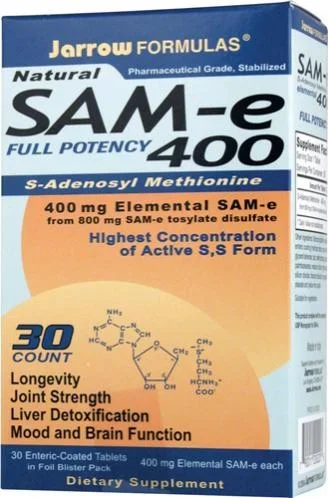
SAMe is generally considered safe when taken in appropriate doses. People with bipolar (manic/depressive) disorder should be aware that it could trigger a manic phase. People taking standard antidepressants, including MAO inhibitors, SSRIs, and tricyclics should not take SAMe except on a physician’s advice. It has been shown to help SSRI drugs work better when used in combination. It is fairly well tolerated but be it can cause jitteriness or gut problems in some.
I am convinced that this supplement works for depression and fatigue. I have taken 400 mg twice a day for a few months and can definitely feel a difference. I actually get reminded when I do not take it by my having decreased energy. An added bonus is that it can also decrease liver enzymes.
SAMe is not cheap. There are many different manufacturers but I use the Jarrow Formulas brand, as I trust their quality control. It comes in foil-protected 200 mg-capsules since it tends to lose its effectiveness when exposed to air.
I am including a study done at ACRIA that found benefits in treating depression in people living with HIV: www.pubmedcentral.nih.gov/articlerender.fcgi?artid=535560
Talk to your doctor before taking this supplement. Do not stop taking your antidepressants to switch to SAMe since it has not been fully studied in large controlled studies.
Start at a small dose of 100 mg twice a day on an empty stomach and see how you feel with that dose. If you do not feel any more energy, increase the dose to 200 mg twice a day and so on until the maximum dose of 400 mg twice is achieved. You may have to lower the dose if you start feeling anxious.
PERSONAL COMMENTS: Because of terrible bouts with fatigue in the past, I was referred to a sleep lab and diagnosed with mild sleep apnea. I tried CPAP with different masks (they are smaller ones with “nose pillows” and many other designs, so don’t give up early without trying different styles). I could not get used to it. I have had my thyroid and adrenal functions checked without finding any problems. I have tried Nuvigil, Adderall, and SAMe with good results for my fatigue. Unfortunately, I get anxious if I use them for long periods, so I only use them as needed. What has made the most difference, besides keeping my testosterone in the upper side of the normal range, is going to bed around the same time at night and waking up also at the same time. Traveling and other factors can interfere with maintaining a normal sleep cycle, but the fact is I need to listen to my body’s needs. I can usually be tired enough to get better sleep by the time bedtime arrives if I avoid caffeine after 3 pm and don’t exercise too late at night. Being aware of any potential bouts of depression and negative thinking has also helped me to be proactive about not letting my energy levels plummet.
Another common reason why you are tired while using TRT: Low ferritin.
Testosterone Replacement Therapy (TRT) Decreases Ferritin - Excel Male TRT Forum
Testosterone replacement can cause a decrease in ferritin in men even without the presence or use of blood donations or therapeutic phlebotomies. A study gave men testosterone enanthate at a dose of 125 mg per week (it also used T enanthate with or without finasteride to see the effect of...

Fatigue Test Panel- Comprehensive
Uncover the benefits of the Comprehensive Fatigue Lab Panel in assessing fatigue. Find detailed information on DiscountedLabs
Last edited by a moderator:




